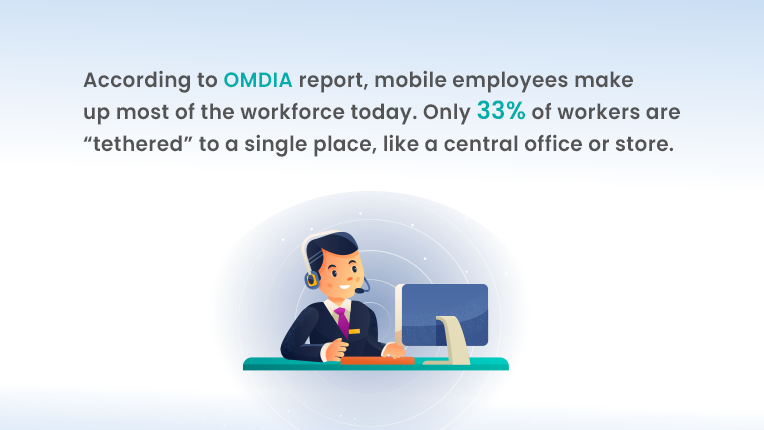
May 30, 2023

May 30, 2023
The emergence of cloud technology has revolutionized how businesses worldwide operate, especially when it comes to communication and collaboration. It would be completely appropriate to say that cloud telephony has been a game changer for businesses seeking to enable remote work capabilities. Back in 1994, remote workers made up ‘near-zero’ of the global workforce. However today, it is extended to about 40 percent of all roles, with half of the world’s workforce likely to become mobile by 2028 (Source: BBC). In another study by Owl Labs, it has been found that “Globally, 16% of companies are fully remote.”
In this blog post, we are going to explore how cloud telephony empowers businesses to work remotely by fostering seamless communication and collaboration.
Table of Contents
Cloud Telephony is a modern communication technology that incorporates cloud computing and the internet together to manage and drive voice communication. Not only this technology eliminates the need for traditional on-premise telephone systems but also offers advanced features like call routing, Interactive Voice Response, voicemail to email, and many more. Moreover, cloud telephony also offers advanced tools for call recording, reporting, and analytics. Overall, cloud telephony solutions offer more flexibility and scalability to businesses.
Remote collaboration has become an indispensable part of the modern business landscape for several reasons.
Today remote work has become a norm and cloud telephony technology presents itself as a powerful solution supporting remote collaboration and helping teams to work as efficiently as they would do in the same physical office space. Some key pointers supporting this statement are mentioned below:
There are several parameters basis which cloud telephony differs from traditional telephone systems. Let’s have a look:
Traditional: These systems require hardware, and physical phone lines and are installed on-premise.
Cloud Telephony: Works over the internet to route calls and eliminates the need for on-premise hardware / physical infrastructure.
Traditional: As these systems require on-premise hardware setup and maintenance, it is mandatory to hire technical IT staff for system management.
Cloud Telephony: Setting up cloud phone systems is easy as there is only a software application to be installed on the device. The maintenance and other management are handled by service providers.
Traditional: Additional hardware is required to add more lines which means more investment making it an expensive option.
Cloud Telephony: This can be easily scaled up or down by selecting suitable service plans to add virtual phone numbers.
Traditional: These systems are location-bound, which means remote collaboration is not possible.
Cloud Telephony: Remote collaboration is easily possible using these systems as they are location-independent and can be accessed from any internet-connected device.
Traditional: Demand high upfront investment for hardware and installation. There’s also a continuous maintenance fee.
Cloud Telephony: These solutions are available in subscription-based models, leading to reduced upfront investment and predictable monthly costs.
Traditional: These systems only offer basic features like call forwarding and voicemail.
Cloud Telephony: These modern-day solutions provide a wide range of advanced features such as voicemail to email, call routing, IVR, etc.
Traditional: These systems demand additional monetary investment for integrating with other collaboration platforms.
Cloud Telephony: Seamless integration with other platforms like CRM systems.
Traditional: Highly vulnerable to physical damages and outages in the on-premise infrastructure.
Cloud Telephony: Service providers maintain backup servers in different remote locations ensuring continuous communication whenever there’s any unexpected event.
Traditional: Limited to a geographical area of the business’s physical office.
Cloud Telephony: Using multiple virtual phone numbers businesses can establish a global presence without investing in any physical office setup.
Traditional: It demands more investment in terms of time and money from the business’s side to upgrade hardware and software.
Cloud Telephony: Here it is the responsibility of the service providers to update and enhance features from time to time without causing any disruption in the service.

According to a forecast from International Data Corporation (IDC), the U.S. mobile worker population will grow to 93.5 million mobile workers in 2024. IDC expects mobile workers will account for nearly 60% of the total U.S. workforce by the end of 2024.
In the era of wired business telephone systems, nobody would have imagined that working from outside the physical office space would be possible. Cloud Telephony empowers companies and employees to access their office phone systems and features from anywhere with an internet-enabled device. So whether one is at home, sitting in a co-working space, or simply traveling, remote employees can take their business calls and stay connected and productive just as they used to be in their physical office space.
Cloud Telephony plays a pivotal role in creating a unified work environment enabling employees to stay connected in real-time and have access to various communication and collaboration features regardless of their physical location. A cloud telephony system acts as a unified platform that helps employees in maintaining a consistent business presence by offering access to Virtual Phone Numbers and Extensions on various internet-enabled devices.
Cloud Telephony helps optimize business communication and enhance the remote work experience by offering a range of advanced features. This includes features like Call Recording, Voicemail, Call Queuing, Call Reporting, Analytics, etc. Employees and companies get access to useful data related to call volumes, customer calling patterns, duration of the calls, and much more. All this information is quite valuable in improving customer-agent interactions and helps in making data-driven business decisions.
Even during unforeseen events and disasters, cloud telephony systems remain up and working because these systems maintain redundant backups and disaster recovery mechanisms. So whether there’s a power outage or physical office closure, remote employees can continue their work seamlessly as they can access the business phone systems through various internet-enabled devices such as laptops, tablets, etc.
Automation has been a boon for many companies around the globe and Auto Attendant is a perfect example of it. Also called a Virtual Receptionist or IVR i.e. Interactive Voice Response, this technology allows for automated call handling. It presents callers with predefined voice menus and answers to their basic queries. Intelligent call-routing capabilities of the IVR ensure that all incoming calls are directed or routed to the right agents regardless of their geographical locations. This helps companies in presenting their callers with a professional and seamless calling experience.
There is no denying that money matters a great deal. Cloud telephony enables companies or businesses to save significantly on upfront investments such as buying costly equipment, installation, and maintenance of the telephone infrastructure. The fact that the cloud can trim down initial costs for startup businesses by up to 90% clearly shows the economic benefits of cloud phone systems. Moreover, cloud phone systems also offer easy scalability allowing businesses to add or remove phone extensions as per their changing requirements without much hassle.
Cloud telephony solutions can add real value to a business when implemented in the right way. So if you agree to this, then the first step is to choose a cloud telephony service provider that can cater to your specific business needs.
You can conduct some research and prepare a list of potential vendors. To do this, read online reviews and evaluate features that are useful for your business communication needs.
The transition from your existing communication and collaboration systems to the new cloud telephony solution should be smooth and seamless. You must ensure that the solution you are choosing is compatible with your current systems and platforms.
Considering the security of your business data when choosing a cloud telephony solution is simply essential. Check whether the vendor implements the latest data protection measures, encryption techniques and complies with the industry regulations like GDPR, HIPPA, etc.
No matter which system you choose, it’s ultimately going to be used mainly by your employees. So it is important to ensure that your employees are comfortable in using the new platform. You can conduct training sessions to help them understand and learn the usage of the new cloud telephony platform. Also, ensure that you have responsive and 24/7 support from your vendor’s side so that for any problems encountered, you and your employees can reach out to the vendor and get a resolution.
Today’s world is extremely digitally-driven and to attain sustainable growth and operational efficiency, businesses need to explore cloud telephony solutions. Businesses must not consider cloud telephony as just a communication tool but a strategic asset that can empower them to grow and thrive in today’s ever-evolving business landscape.

In the era of remote work, every company needs a powerful cloud-based communication platform like KloudTalk that fosters effective communication and collaboration among team members working from different locations. Besides unifying remote teams, KloudTalk also improves overall productivity and teamwork. If you are a small business or a startup looking forward to choosing a reliable and robust cloud telephony solution, then please get in touch with us. We will be happy to help!
Note- This post has been updated on 27-08-23.
Top Heading
2030 Views 0 Comments